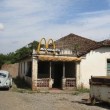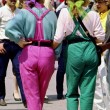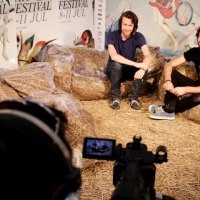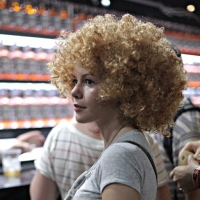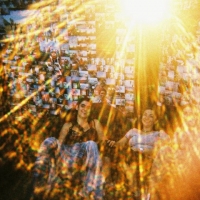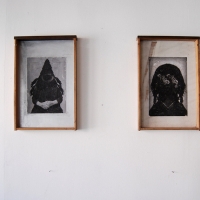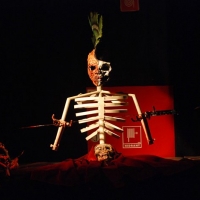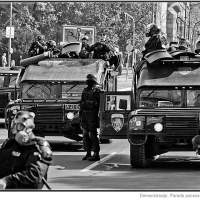We’ve compiled some of the best Yugoslav pro-gay music videos and song lyrics from the 1970s onwards. Ranging from post-punk to electro-pop to traditional folk, many of these tracks were written by some of the coolest regional artists, back in the day when it wasn’t okay to be gay. Well, it still isn’t, at least in the Balkans. Read the Part two here
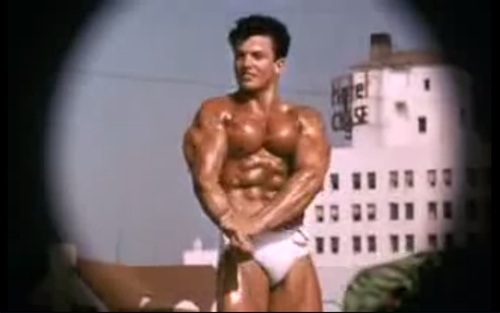
In socialist Yugoslavia, homosexuality was decriminalised in the second half of 1970s. When still treated as a disease and/or offence, homosexuality and lesbianism was nevertheless depicted in some Yugoslav ‘black wave’ films of the late sixties and early seventies. But what about popular music?
It’s no surprise that the punk movement to a certain degree, openly embraced gay discourse. At least in terms of fashion, style and cultural identity. More surprising is that traditional folk beat punk rock to it. In 1974 Muharem Serbezovski, one of the uncrowned kings of the Balkan Roma music, recorded a four-track 7” single featuring a traditional Indian track Ramu, Ramu or Ramo, Ramo with surprisingly direct lyrics. It’s probably the first officially released pro-gay song in Yugoslavia. The lyrics could hardly be interpreted as something other but a sad story of a lost love relationship between two men. Before you give Muharem a shot, let me just remind you that words like ‘drug’ and ‘drugar’, occurring in original lyrics of most of the songs featured here definitely refer to men, so the English translations, ‘friend’ and ‘mate’, don’t do them justice.
Muharem Serbezovski – Ramu, Ramu (Ramo, Ramo, single, 1974)
When I met a mate of mine, my only friend/It was the happiest day as I wasn’t alone any more/A song consoled us, fate smiled at us/But the storm of evil fate took him away from me/Ramo, Ramo, my mate/Ramo, Ramo, my mate/Do you hear my groan/Now I live alone in the dark like the extinguished sun flame/Because you went away and found a better life/Yet I hope and call to you: Come back/Ramo, come back to me/We have the same destiny
Free male love
Unlike the above, the most prominent theme in gay-oriented lyrics in socialist Yugoslavia was a difficult-to-resolve tension between the dominant and alternative sexuality of the main protagonist. This is most often represented through hiding in parks at night and hinting at the leading character’s bisexuality. Nevertheless, here’s another of those rare exceptions to the rule, written by Croatian quasi punk, later turned middle-of-the-road-nationalist rock band from Zagreb, Prljavo Kazalište. Although using the park milieu, this has been arguably the most explicit pro-gay rock’n’roll statement the region has ever produced, without bullshitting anyone.
Prljavo Kazalište – Neki dječaci (Some boys, Prljavo kazalište 1979)
You’re waking with your male companions/You cross the street/You point your finger at me/You’re laughing/You know this hurts me so much/’Cause if there’s anyone who loves you/Well, that’s me/You’re walking with your male companions/You chase dirty women/And I’m waiting for you fatefully like a dog/I know you try to make me jealous/ ‘Cause how many times/Have you told me in the park/I’m in favour of free male love/I’m in favour of free male love
In 1980, the media’s gay radar was switched on in Belgrade. First, one of the will-be most praised Yugoslav bands of all times, Belgrade’s VIS Idoli, released a debut single which earned them some points in the gay community, but at the same time exposed them to a continuous flow of journalists’ interrogations about whether or not they are homosexuals. The song is still a huge hit, on and off gay dance floors; not only in the Balkans but also in Poland, where a cover version was released in 2001.
VIS Idoli – Retko te viđam sa devojkama (I Rarely See You with Girls, single, 1980)
I rarely see you with girls/Although I see you every day/Yet you’re never alone/You’re surrounded by boys/They’re nice but mind you/Rumours spread quickly/When they pop it will be the end/Believe me/Believe me/You rarely see me with girls/Although you see me every day/Still I’m never lonely/I am fond of girls/I like them but you have to know/I am no good around them/One date and it’s over/Believe me/Believe me
The second openly pro-gay song produced by a Belgrade band was never released on a record. Still, it was one of the most influential pro-gay songs in Yugoslavia featured in a cult film Dečko koji obećava (The promising boy, 1981) which involved a number of Serbia’s most respected new wave bands and visual artists. Balada o tvrdim grudima (Ballad of a hard bosom) was recorded by Šarlo Akrobata and sang by Dušan Kojić Koja (Šarlo Akrobata, Disciplina kičme, Disciplin A Kitschme) and the film’s lead actor, Aleksandar Berček. Ironically, the character played by Berček is called Slobodan Milošević, while the plot follows his decision to enjoy a life of absolute freedom, right or wrong.
Šarlo akrobata (VIS Dobri Dečaci/The Good Boys) – Balada o tvrdim grudima (Ballad of a hard bosom, The promising boy film, 1981)
I’ve had enough/I’ve got the most good-looking girl/When we walk the street everybody looks at her/When she dances in the disco everybody looks at her… I’ve had enough/I don’t want the most good-looking girl/I want to come back to you ‘cause you’re mine (Koja)/I want to come back to you ‘cause you’re mine (Berček)/So I can sleep on your hard bosom(Koja)/So I can sleep on your hard bosom(Berček)/’Cause I’m yours (Koja)/You’re mine (Berček)
The Closet Gay in Gay’s Clothing
In 1983, the Yugoslav supergroup from Sarajevo, Bijelo Dugme, released a music video for Ovaj ples dame biraju (The Ladies’ Choice Dance), which featured the lead singer hitting on men at a tuxedo dress-coded party. Although far from promoting gay themes lyrics-wise, the video was considered seriously controversial in some circles and, of course, very hip in others.
Bijelo Dugme – Ovaj ples dame biraju (The ladies’ choice dance, Uspavanka za Radmilu M., 1984)
Speaking of gay-themed pop culture, there were a few other Yugoslav musicians who heavily drew on stereotypical gay and trans imagery in their performances, music videos and record sleeves art without
being too progressive in their lyrics. Oliver Mandić and D’BoyS are a case in point, to name just a couple. Which doesn’t necessarily mean they weren’t gay. It’s just that the coming out was still rather difficult at the time. Or was it really?
I don’t know much about this next band, but I figure it’s another one struggling with their heterosexual demons in the lyrics while drawing quite openly on a conventionally polished eighties gay look. Also, the name of the band Hladna braća (Cold brothers) plays with a rather direct gay reference, paraphrasing the idiom ‘topla braća’ (warm brothers). Indeed, borrowing from German, the ‘polite’ mainstream discourse in Yugoslavia often referred to gay men as ‘warm brothers’. Here’s a fan video of their kitschy pop song hinting to a gay-friendly reputation of certain Mediterranean islands.
Hladna Braća – Ljubi me na Ibici (Kiss me on Ibiza, Poludećemo zajedno, 1987)
She wants everything now/For this, one needs millions of millions/Of Dollars … /For her to be happy in the future/Sooner or later I’ll get some dough/Sooner or later I’ll make my dreams come true/Sooner or later she’ll be just mine/Sooner or later she’ll be happy/Kiss me on Ibiza, Caress me on Corsica/Palma will burn/Capri will sink
My girlfriend Ana
Arguably the first pop song with explicit lesbian lyrics in socialist Yugoslavia, Moja prijateljica (My girlfriend), was released in 1982 as the first single by a synth pop band, Xenia, from Rijeka, a Croatian seaside town. It’s been a hit ever since.
Xenia – Moja prijateljica (My girlfriend, single, 1982)
My girlfriend/She’s so beautiful/I’m so proud/Men turn around to see her/To see my girlfriend/Men would like to touch her/Men would like to hide her/From me/Men would like to dream with her/Men would like to sleep with her/Without me
Although it might had seemed that Slovenian popular song writers were legging behind the Yugoslav colleagues, Slovenia’s pro-LGBT forces soon managed to catch up with the rest. First, it was Videosex’s Anja Rupel venting out some great lesbian lyrics which is why, besides her being underage and the album a masterpiece, Rupel and Videosex instantly attracted a huge cult following:
Videosex – Ana (Video Sex ’84, 1984)
Ana, you’re well aware/What you’re doing is forbidden here/First time, women’s toilet/I really didn’t want it/Inflammatory secret gained freedom/Smiling eyes looking at me/I’d love to disappear/I’d love to, I’d love to so much/I’d love to be able to love you/Ana, why do I love you like crazy?/Ana, I’m well aware/You hate me when you’re alone/Yesterday evening I was cursing the bad luck/You’re well aware/You can come over any time/Your sighs mean a lot to me/Your wax is full of passion/Ana, why do I love you like crazy?
*The author is responsible for all the above (mostly literal) translations. Poor as they may be, you’re welcome to subject them to further improvements. Read the Part two here

